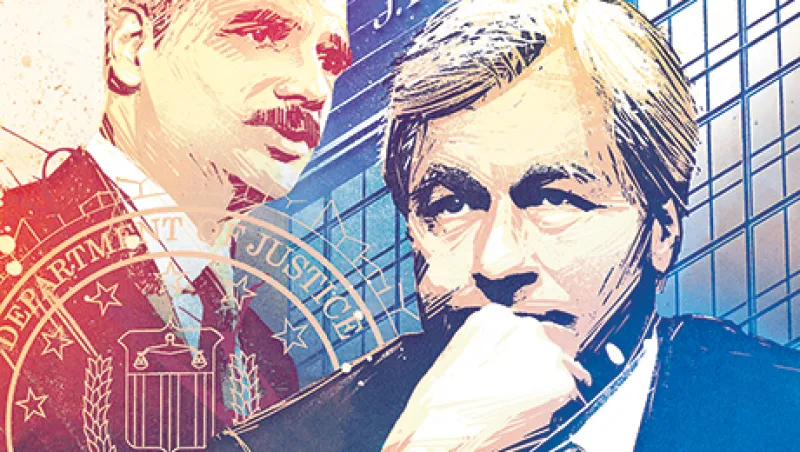How worried should Wall Street be? When Jamie Dimon announced in early September that JPMorgan Chase & Co. had bolstered its litigation reserves by $9.2 billion to $23 billion, leading the bank to report its first quarterly loss under his watch, the collective intake of breath across Wall Street was sharp. “This is very painful for the company,” chairman, president and CEO Dimon told analysts. Now that JPMorgan appears to be on the cusp of finalizing a mega-settlement with the U.S. Department of Justice, rumored to be in the region of $13 billion, the banking industry is bracing for a wave of litigation expenses that could roll on for years.
The JPMorgan deal follows an $11.6 billion settlement between Bank of America and Fannie Mae earlier this year and a separate $8.5 billion settlement between federal regulators and ten banks, including BofA, over mortgage foreclosures, not to mention a string of smaller fines over everything from municipal bond price rigging to money laundering. Having weathered nearly five years of criticism that they’ve been too soft on Wall Street, the feds are beginning to flex some serious muscle.
“Clearly, something has changed in the last year or so, and it’s worrisome,” says Jason Goldberg, a New York–based banking analyst with Barclays Capital.
And this may be just the start. Although details of the total mortgage settlement are yet to be finalized, JPMorgan has confirmed that $5.1 billion will go to the Federal Housing Finance Agency for defective mortgages sold to Fannie Mae and Freddie Mac, the government-controlled mortgage finance firms, in the run-up to the 2008 crisis. The FHFA sued 18 banks for more than $200 billion over subprime-era mortgage securities in late 2011; 14 of those suits are outstanding, so there’s a lot of punishment to come. Using JPMorgan’s settlement as a guide, analysts estimate that the 14 banks might have to pay more than $20 billion to settle the remaining FHFA claims. Whether the stock market will care is debatable. The stock prices of Wall Street’s five largest banks have increased between 20 percent (JPMorgan) and more than 50 percent (Morgan Stanley) since January 1. The big banks are still an attractive long-term investment opportunity, argues Goldberg, “especially when you consider that they would benefit from the taper and higher interest rates” ahead.
Bruce Van Saun, the new CEO of Providence, Rhode Island–based RBS Citizens Financial Group, expects that settlements with JPMorgan and BofA, the two biggest players in the precrisis mortgage securitization market, will be a template for how federal regulators manage the resolution of outstanding subprime issues. “Governmental agencies usually go after the big guys first,” Van Saun says. “I do think that once JPM and BofA get dealt with, you’ll see this trickling over to everybody else and there will be more settlements. Over the next two years, you’ll see most of this backlog cleaned up.”
But the FHFA component is just one part of the mortgage mess; criminal prosecutions may still follow any civil settlement that JPMorgan reaches, and most of the liabilities arising out of so-called private label securitization, which includes mortgage-backed securities sold to nongovernment entities, remain unresolved. Look beyond mortgages, and the menu of legal headaches for most big banks on Wall Street is long: JPMorgan alone is under investigation for everything from its energy-trading practices to its ties to Bernie Madoff, the disgraced former investment manager, and its hiring of the children of top Chinese officials.
“The industry has entered a period of ‘Big Brother Banking,’ where the fortunes of a bank are more closely tied to the government,” Mike Mayo, a New York–based banking analyst with brokerage and research firm CLSA, wrote in a recent note. Columbia University law professor John Coffee Jr. agrees, arguing that the combination of a White House unconstrained by the need to seek reelection and Attorney General Eric Holder’s desire to leave a legacy has empowered regulators to be more aggressive with the banks. “The Obama administration has no need to kowtow to the financial industry and no need to change its stance,” Coffee says.
But there’s good news for banks amid the gloom: The 8.9 percent average return on equity across Wall Street’s largest banks in the second quarter was the highest since the same period in 2007, with most institutions recording buoyant capital, liquidity and profits. Shareholders may suffer when banks’ performance is weighed down by legal costs, but “the banks have much deeper pockets today than they did three years ago, so they can withstand these legal issues,” says Barclays’s Goldberg, even though no one knows the exact size of the legal damage ahead for the industry. If ever there was a good time for Wall Street to be hit with billions in fines, this is it.
Read more about banking and regulation.







